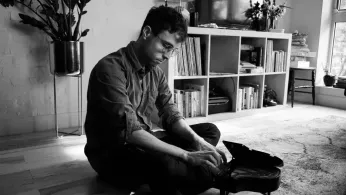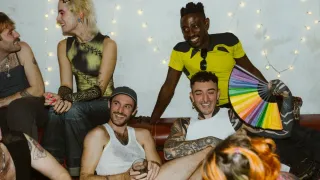
4 hours ago
How Mark Sonnenblick and a Queer Songwriting Dream Team Made K-Pop Demon Hunters’ “Golden” Shine
READ TIME: 3 MIN.
If you’ve been anywhere near a streaming device or a queer group chat lately, you’ve probably caught the infectious hook of “Golden”—the shimmering anthem at the heart of Netflix’s animated musical "KPop Demon Hunters". The song, powered by a fierce girl group and a supernatural storyline, has become more than just an earworm: it’s an international pop event, a beacon for queer joy, and, as it turns out, the handiwork of one of Broadway’s most exciting out songwriters, Mark Sonnenblick.
Mark Sonnenblick isn’t exactly new to the spotlight. His work has previously illuminated theater stages and indie music playlists, but “Golden”—co-written with Korean-American hitmaker Ejae—marks his first foray into the glitter-drenched, high-stakes world of K-pop. “I think there’s something inherently queer about K-pop,” Sonnenblick shared in a recent interview. “The spectacle, the transformation, the idea of found family and reinvention—it’s all there.”
The film itself is a fever dream of genre fusion: a once-famous K-pop girl group, forced to reunite and save the world from supernatural threats, armed with killer choreography and next-level vocals. It’s camp, it’s action, and it’s more than a little bit queer—both onscreen and behind the scenes.
The "KPop Demon Hunters" soundtrack is stacked with heavyweight producers and songwriters from both sides of the Pacific, but “Golden” stands out as a rallying cry for anyone who’s ever felt like an outsider. The track, performed by Ejae, Audrey Nuna, and Rei Ami as in-universe idols Huntr/x, pulses with themes of resilience and unapologetic self-love.
“Going up, up, up—it’s our moment... gonna be, gonna be golden,” the chorus proclaims, and it’s hard not to see the queer metaphor shimmering between the lines.
In a behind-the-scenes breakdown, Sonnenblick explained, “So much of musical storytelling is about creating that goosebumps moment—when you hear the song and you know, that’s my story too.” For queer listeners, those moments are often hard-won, and “Golden” feels like a glitter canon going off in the heart of the mainstream.
At the heart of the song’s magic is the creative chemistry between Sonnenblick and Ejae, a Korean-American songwriter and performer with her own history of navigating the idol training system. The pair found inspiration in the dualities of K-pop—idolatry and individuality, darkness and light, fantasy and reality. “There’s a double entendre in the lyrics,” Ejae noted. “Idolizing someone can be toxic, but the song is about finding the gold inside yourself, not in someone else.”
For Sonnenblick, the project was also a chance to bring queer storytelling into a global pop context. “There’s something radical about letting queer voices shape the biggest, glossiest pop moments,” he reflected. “We’re not just sidekicks or comic relief—we can be the main event.”
It’s not just the beat that makes “Golden” a queer anthem—it’s the spirit. K-pop’s history is filled with coded messages and subversive performances, but "KPop Demon Hunters" takes it a step further by centering a queer creator in the writing room, and by giving its characters arcs that mirror the coming-out journeys so many LGBTQ+ people know intimately.
The film’s embrace of found family, redemption, and transformation echoes classic queer narratives. The girl group at the story’s center are misfits, forced to mask their true selves and, ultimately, to step into their power by being honest and bold. It’s the stuff of drag ballads and pride marches, repackaged for a new generation—one that sees themselves not just as fans, but as heroes.
“I grew up loving pop, but not always seeing myself in it,” Sonnenblick said. “Now, to have a song that’s sung by idols, in a movie about fighting literal and metaphorical demons? That’s the dream.”
The success of “Golden” is more than just a chart milestone (the album was certified Platinum by the RIAA, with over a million units sold by October 2025)—it’s a signal that queer voices are not just welcome, but necessary, in shaping the future of global pop. As K-pop continues to expand and diversify, the inclusion of LGBTQ+ writers, producers, and performers is no longer just a nice-to-have: it’s an imperative.
Sonnenblick’s journey is a beacon for queer creatives everywhere. “Music is about connection,” he enthused. “Queer people have always found ways to sneak our stories into the mainstream, but now, finally, we’re getting to tell them on our own terms—and the world is listening.”
So the next time you’re dancing to “Golden,” remember: it’s more than a song. It’s a celebration, a coming out, and a victory dance for every queer kid who dreamed of seeing themselves center stage, bathed in golden light.






